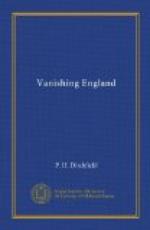[Illustration: Old Shop, formerly standing in Cliffe High Street, Lewes]
But even in the sleepy hollows of old England the pulse beats faster than of yore, and we shall only just be in time to rescue from oblivion and the house-breaker some of our heritage. Old city walls that have defied the attacks of time and of Cromwell’s Ironsides are often in danger from the wiseacres who preside on borough corporations. Town halls picturesque and beautiful in their old age have to make way for the creations of the local architect. Old shops have to be pulled down in order to provide a site for a universal emporium or a motor garage. Nor are buildings the only things that are passing away. The extensive use of motor-cars and highway vandalism are destroying the peculiar beauty of the English roadside. The swift-speeding cars create clouds of white dust which settles upon the hedges and trees, covering them with it and obscuring the wayside flowers and hiding all their attractiveness. Corn and grass are injured and destroyed by the dust clouds. The charm and poetry of the country walk are destroyed by motoring demons, and the wayside cottage-gardens, once the most attractive feature of the English landscape, are ruined. The elder England, too, is vanishing in the modes, habits, and manners of her people. Never was the truth of the old oft-quoted Latin proverb—Tempora mutantur, et nos mutamur in illis—so pathetically emphatic as it is to-day. The people are changing in their habits and modes of thought. They no longer take pleasure in the simple joys of their forefathers. Hence in our chronicle of Vanishing England we shall have to refer to some of those strange customs which date back to primeval ages, but which the railways, excursion trains, and the schoolmaster in a few years will render obsolete.
In recording the England that is vanishing the artist’s pencil will play a more prominent part than the writer’s pen. The graphic sketches that illustrate this book are far more valuable and helpful to the discernment of the things that remain than the most effective descriptions. We have tried together to gather up the fragments that remain that nothing be lost; and though there may be much that we have not gathered, the examples herein given of some of the treasures that are left may be useful in creating a greater reverence for the work bequeathed to us by our forefathers, and in strengthening the hands of those who would preserve them. Happily we are still able to use the present participle, not the past. It is vanishing England, not vanished, of which we treat; and if we can succeed in promoting an affection for the relics of antiquity that time has spared, our labours will not have been in vain or the object of this book unattained.
[Illustration: Paradise Square, Banbury]
CHAPTER II
THE DISAPPEARANCE OF ENGLAND




